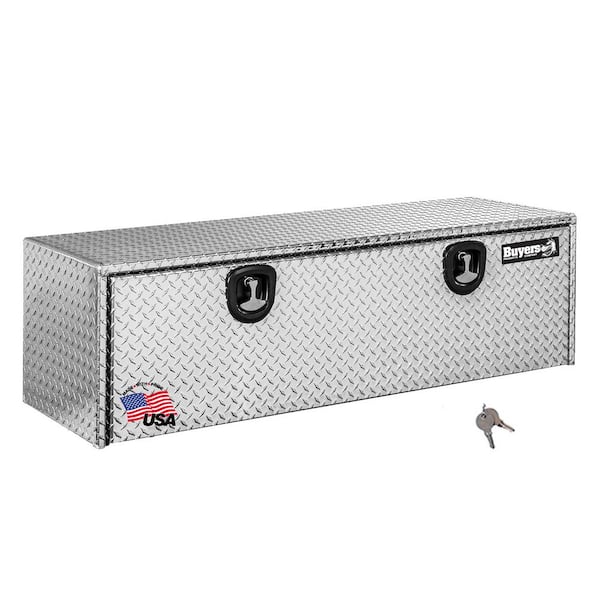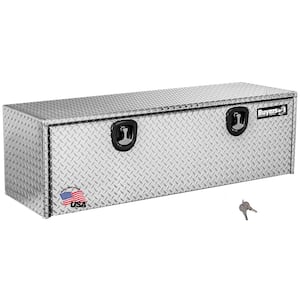Steel Vs Aluminum Truck Tool Box Comparison
Steel truck tool boxes offer superior durability and security, while aluminum options are lighter and more corrosion-resistant. When choosing between the two, consider factors such as budget, weight needs, and level of protection required for your tools.
Steel tool boxes are known for their toughness, making them ideal for heavy-duty use, but they can be heavier and prone to rust. On the other hand, aluminum tool boxes provide lighter weight and better resistance to corrosion, making them a popular choice for customers looking for longevity and ease of maintenance.
Ultimately, the decision between steel and aluminum truck tool boxes will depend on your specific preferences and requirements.

Credit: www.homedepot.com
Strength And Durability
Strength and Durability:
When it comes to selecting a truck tool box, two commonly preferred materials are steel and aluminum. Both materials have their own set of advantages and it’s important to understand how they compare in terms of strength and durability. Let’s dive deeper into the material composition, impact resistance, and other factors that contribute to the overall durability of steel and aluminum truck tool boxes.
Material Composition:
A key factor in the strength and durability of truck tool boxes is the material composition. Steel tool boxes are typically made from heavy-duty, high-strength steel that provides excellent rigidity and structural integrity. On the other hand, aluminum tool boxes are made from lightweight aluminum alloys that are known for their corrosion resistance and longevity.
Impact Resistance:
When it comes to withstanding impacts and heavy-duty usage, steel tool boxes have the upper hand. The robust nature of steel makes it more resistant to dents, scratches, and other types of damage that can occur during transportation or while loading and unloading tools and equipment. However, it’s worth noting that aluminum tool boxes are not far behind. They are still quite durable and can withstand moderate impacts without losing their structural integrity.
One key advantage of aluminum tool boxes is their ability to bounce back from impacts. Unlike steel, which may dent and retain the damage, aluminum possesses a certain level of flexibility that allows it to regain its original shape to some extent. This can be an important consideration for those who frequently encounter rough road conditions or frequently load and unload heavy objects.
Overall, when it comes to strength and durability, steel tool boxes have a slight edge over aluminum. However, it’s worth considering other factors such as weight, corrosion resistance, and price before making a final decision. By understanding the material composition, impact resistance, and other relevant factors, you can make an informed choice that best suits your specific needs and preferences.
Weight And Portability
When comparing steel and aluminum truck tool boxes, weight and portability are crucial factors to consider. Understanding how each material affects the overall weight and maneuverability of the tool box can help you make an informed decision based on your specific needs.
Weight Considerations
Steel tool boxes are generally heavier than aluminum ones, which can impact the total weight of your truck when transporting heavy loads. The weight of the tool box must be factored in when considering the overall load capacity of your vehicle.
Portability And Maneuverability
Aluminum tool boxes are lighter in weight, making them easier to handle and move around compared to steel counterparts. This lightweight feature enhances the portability and maneuverability of the tool box, allowing for easier installation and removal as needed.
Corrosion Resistance
Steel and aluminum truck tool boxes offer varying levels of corrosion resistance. Steel tool boxes are prone to rust over time, while aluminum tool boxes boast superior corrosion resistance due to their natural oxide layer, making them ideal for long-term durability in harsh environments.
Rust And Corrosion
Steel and aluminum truck tool boxes offer varying levels of protection against rust and corrosion.
Long-term Durability
Comparing steel and aluminum truck tool boxes for long-term durability is crucial for a lasting investment.

Credit: www.homedepot.com
Cost And Value
When it comes to purchasing a truck tool box, considering the cost and value is a crucial aspect. Understanding the initial investment and long-term cost considerations can help you make an informed decision. In this section, we will compare the cost and value of steel and aluminum truck tool boxes, enabling you to choose the best option for your needs.
Initial Investment
Steel Truck Tool Boxes:
- Durable and strong material suitable for heavy-duty use
- Available at a relatively lower initial cost when compared to aluminum
- Provides excellent security and protection for your tools and equipment
Aluminum Truck Tool Boxes:
- Lightweight material that allows for improved fuel efficiency and easier installation
- Usually priced higher initially when compared to steel
- Offers superior resistance to rust and corrosion, ensuring longevity
When considering the initial investment, the choice between steel and aluminum depends on your specific requirements. If you are looking for a cost-effective option that prioritizes strength and security, steel tool boxes are a suitable choice. However, if lightweight construction and long-term durability are your priorities, aluminum tool boxes may be worth the higher initial cost.
Long-term Cost Considerations
Maintenance and Repair:
Both steel and aluminum tool boxes require regular maintenance to ensure longevity and functionality. Steel may be susceptible to rust and corrosion if not properly cared for, while aluminum generally requires less maintenance due to its natural resistance to rust. However, if damages occur, repairing a steel tool box tends to be less expensive compared to aluminum.
Fuel Efficiency:
One important long-term cost consideration is fuel efficiency. Aluminum tool boxes contribute to improved fuel efficiency due to their lightweight construction, reducing the overall weight of the truck. This can translate into cost savings over time, especially if you frequently travel long distances or transport heavy loads.
Resale Value:
When it comes to the resale value, aluminum truck tool boxes often retain their value better than steel ones due to their durability and resistance to rust. This can be advantageous if you plan on upgrading or selling your truck in the future.
In conclusion, both steel and aluminum truck tool boxes have their own benefits and considerations in terms of cost and value. While steel tool boxes may have a lower initial investment and offer excellent security, aluminum tool boxes provide advantages such as lightweight construction, resistance to rust, and improved fuel efficiency. Considering your specific requirements and long-term cost considerations will help you make the right choice.
Customization And Aesthetics
When it comes to selecting the right truck tool box, customization options and aesthetic appeal play a vital role. Both steel and aluminum tool boxes offer distinct features in terms of customization and aesthetics, catering to different preferences and needs.
Customization Options
Each material, steel and aluminum, offers different customization options, allowing buyers to tailor their tool box to their specific needs. Steel tool boxes can be easily welded, modified, or accessorized to fit specific requirements, making them highly customizable. On the other hand, aluminum tool boxes can also be customized through various options such as accessory mounting rails, additional compartments, and custom finishes, providing flexibility for users to personalize their storage space.
Aesthetic Appeal
When it comes to aesthetics, both steel and aluminum tool boxes have their own unique appeal. Steel tool boxes are often preferred for their rugged and industrial look, exuding a traditional and robust appearance. In contrast, aluminum tool boxes are known for their sleek and modern appearance, offering a lightweight and contemporary design that appeals to many truck owners.

Credit: www.amazon.com
Frequently Asked Questions On Steel Vs Aluminum Truck Tool Box Comparison
What Is The Best Material For A Truck Box?
The best material for a truck box is aluminum. It is lightweight, durable, and resistant to rust and corrosion. Aluminum truck boxes are also easier to handle and offer better fuel efficiency compared to other materials.
What Is The Best Material For A Tool Box?
The best material for a tool box is usually steel or aluminum due to their durability and strength.
What Are The Advantages Of Metal Toolbox?
Metal toolboxes offer durability, security, and organization for tools. They are resistant to damage and provide long-lasting storage solutions.
What Gauge Of Aluminum Are Truck Tool Boxes?
Truck tool boxes are typically made with aluminum gauges ranging from 16 to 20.
Conclusion
To wrap up our comparison between steel and aluminum truck tool boxes, it’s clear that both materials have their unique benefits. If durability and security are your top priorities, then steel might be the better choice. However, if weight and corrosion resistance are your main concerns, then aluminum is your best bet.
Ultimately, the decision comes down to your specific needs and preferences. Take the time to evaluate your requirements and make an informed choice that will meet all your truck storage needs.
